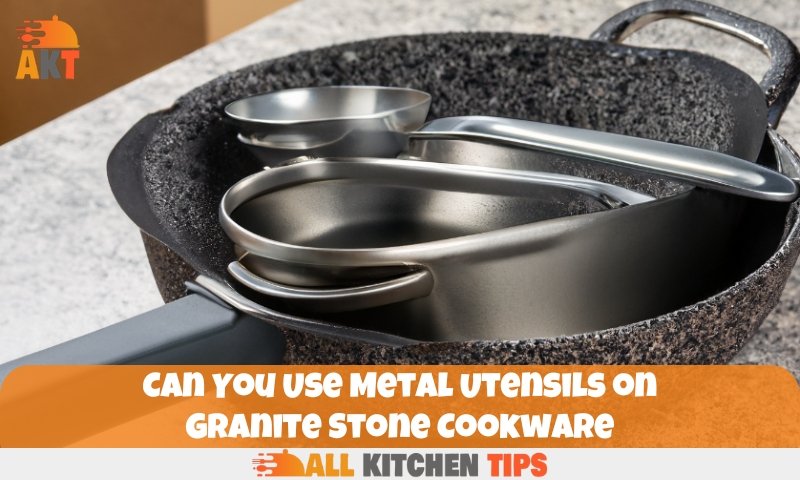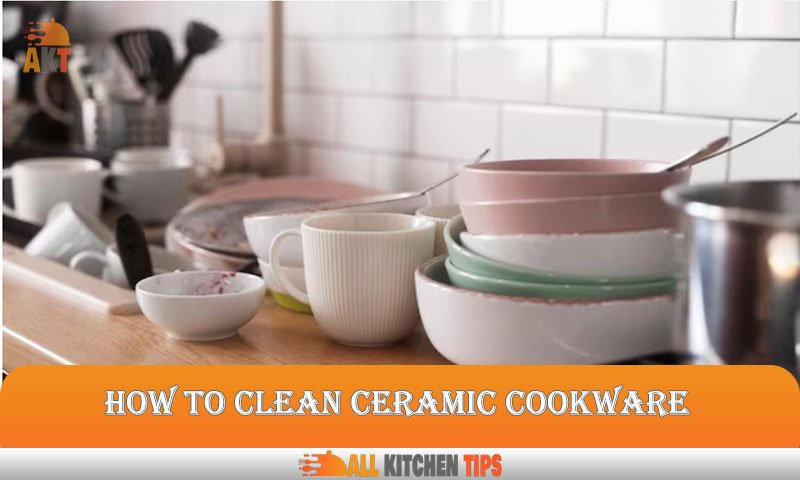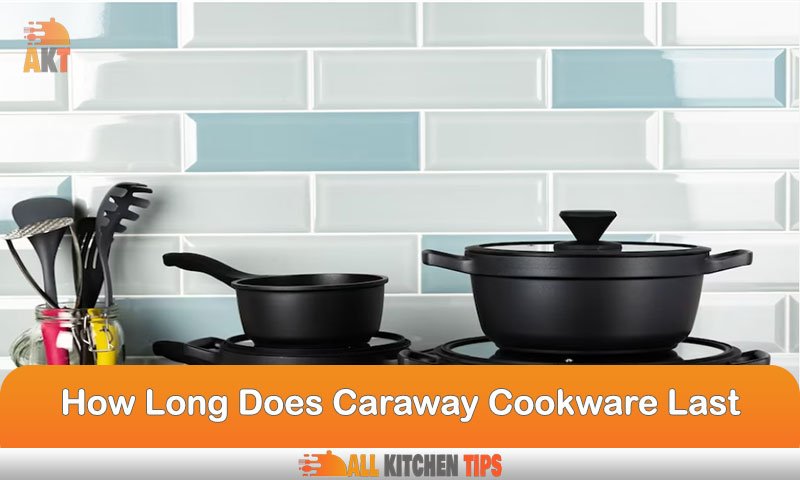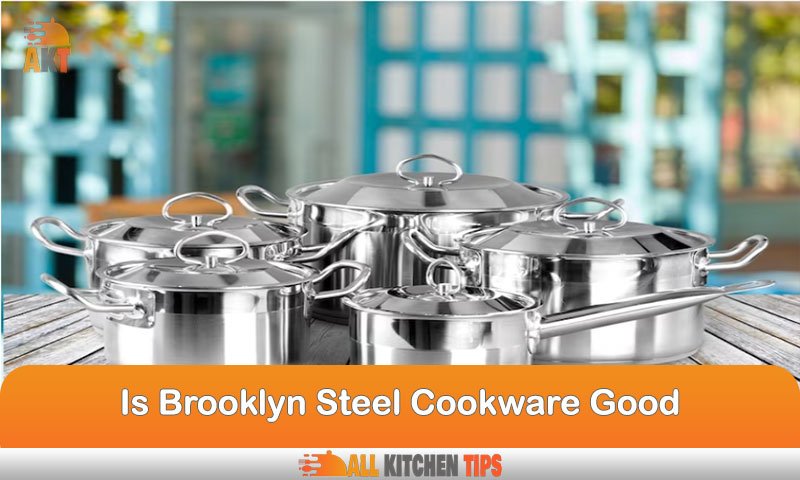Metal utensils should not be used on granite or stone cookware. Metal utensils are able to easily scratch the non-stick surface of granite stone cookware.
Granite stone cookware has gained immense popularity in recent years due to its durability, non-stick surface, and aesthetic appeal. Many people are unsure whether they can use metal utensils on this type of cookware or not. However, using metal utensils on granite cookware can cause scratches that can ruin the cookware’s surface.
This can also lead to food sticking to the cookware and deteriorating its non-stick properties. In contrast, using non-metal utensils, such as wooden or silicone ones, will prevent this problem. Therefore, it is highly recommended to avoid using metal utensils on granite or stone cookware.
Understanding Cookware Materials
Using Cookware Materials That Last

Cookware is an essential part of every kitchen, and with so many options available, it can be challenging to figure out which one is best for your needs. Two of the most popular cookware materials are metal and granite.
While each has its pros and cons, choosing the right one can make a difference in your cooking experience. Here’s a closer look at the differences between metal and granite stone cookware:
Discussing The Difference Between Metal And Granite Stone Cookware
Metal cookware is made from materials like aluminum, copper, stainless steel, and cast iron, making it durable, long-lasting, and able to conduct heat evenly. In contrast, granite stone cookware is made from natural minerals, is nonstick and scratch-resistant, and is an excellent option for cooking at high temperatures.
- Metal cookware is prone to scratching and can react with acidic foods.
- Granite cookware is more chip-resistant and is more likely to protect your pots and pans from scratches.
- Metal cookware can conduct heat much quicker than granite, which may lead to overheating or scorching your food.
- Granite stone cookware is nonreactive and can help prevent excessive reactions to certain foods.
The Pros And Cons Of Each Material
Pros of metal cookware:
- Metal cookware can last for years if you take good care of it.
- Metal cookware is highly versatile and can handle anything from high-heat searing to slow cooking.
- Metal cookware is relatively easy to clean.
Cons of metal cookware:
- Metal cookware can scratch easily, leaving it looking old and worn sooner than you might want.
- Metal cookware can lead to the development of hot spots, which can scorch your food.
- Metal cookware can react to acidic foods such as tomatoes, fundamentally changing the taste.
Pros of granite stone cookware:
- Granite stone cookware is nonreactive and has no effect on your food’s flavor.
- Granite cookware is durable and resists chips and scratches.
- Granite stone cookware is nonstick, so you won’t have to use any added fats or oils to cook your food.
Cons of granite stone cookware:
- Granite stone cookware is much heavier than metal, which can make it difficult for some cooks to handle.
- Granite stone cookware can take a while to heat up, so it’s essential to give it time to warm up before cooking.
- Granite stone cookware can be challenging to clean, so make sure you use the right techniques to maintain it.
Choosing the right cookware can have a significant impact on your cooking experience. Understanding the differences between metal and granite stone cookware is the first step in making an informed decision. Consider your cooking style, needs, and preferences before making a purchase.
With the right cookware, you can prepare delicious, healthy meals for your family and friends for years to come.
Metal Cookware And Its Characteristics
Cooking with metal utensils on granite stone cookware has long been a debate. But before we discuss that, let’s take a closer look at metal cookware and its characteristics.
-metal cookware comprises a variety of material choices, including aluminum, copper, stainless steel, and cast iron.
-the thickness and non-stick coating of metal cookware influence its cooking performance and durability.
Exploring Metal Cookware Advantages
Using metal cookware in your kitchen has benefits:
Heat distribution: metal cookware distributes heat evenly for uniform cooking results.
Long-lasting: metal cookware is durable and can last for years if appropriately maintained.
Versatility: suitable for various cooktops and cooking methods.
Easy to clean: metal cookware is dishwasher-safe and rust-resistant, making it easy to clean and maintain.
Can Metal Utensils Be Used On Metal Cookware?
The answer is that it depends on the type of metal cookware you are using.
stainless steel: safe to use metal utensils since they are made of hard and non-reactive material.
Copper: Avoid using metal utensils since they are soft and susceptible to scratches.
Cast iron: It is safe to use metal utensils on cast iron cookware since it has a non-stick coating.
Although metal cookware allows for efficient heat distribution, longevity, and versatility, it must be appropriately maintained to function effectively. Use this knowledge to select the appropriate metal cookware for your cooking needs and the correct utensils to prevent damage to your cookware.
Advantages Of Metal Cookware

Durable Metal Cookware And Its Advantages
Granite stone cookware is an excellent choice for cooking enthusiasts who want to enjoy healthy meals delivered by non-toxic, non-stick surfaces. However, you might be wondering, Can you use metal utensils on granite stone cookware? The answer is ‘yes’! In fact, metal cookware has several advantages that you should definitely know about.
Durability
Metal utensils are renowned for their toughness and can withstand considerable wear and tear. They are durable, long-lasting, and resistant to scratches, making them perfect for use with granite stone cookware.
- Metal utensils are strong and resistant to bending.
- Metal utensils are tough and will not rust easily.
- You can use metal utensils with granite cookware without worrying about damaging the surface.
Heat Conductivity
Heat conductivity is the ability to transfer heat directly from the source to the material being heated. Metal utensils are excellent in terms of their heat conductivity, allowing the pots and pans to heat up quickly, which translates into faster cooking times.
- Metal utensils conduct heat rapidly, and they take only a few seconds to become warm.
- The heat conductivity of metal utensils ensures heat is distributed evenly across the surface.
- Metals are great conductors of heat and are better than most other materials.
Non-Reactivity
When it comes to cooking, it is essential to avoid any unwanted chemical reactions that may affect the taste or safety of your food. This is where metal utensils come into play.
- Metal utensils are non-reactive, meaning they do not interact with acidic or basic foods.
- Metals do not react to food and cannot change the overall taste of your dish.
- You can cook acidic foods without fear of any unwanted chemical reactions.
Easy Cleaning
Finally, one of the most significant benefits of using metal utensils with granite and stone cookware is their ease of cleaning. Unlike other materials, metal utensils are effortless to clean, ensuring that you have a hassle-free cooking experience.
- Metal utensils are simple to clean, and they do not require any extra care.
- You can use soap and water to clean your metal utensils without worrying about damaging them.
- Metal utensils do not require extra scrubbing or soaking and are an excellent choice for busy households.
Metal utensils are a great choice for cooking with granite stoneware. Their durability, heat conductivity, non-reactivity, and hassle-free cleaning make them an excellent addition to your kitchen. So, go ahead, use your metal utensils on your granite stone cookware, and cook your favorite dishes with confidence!
Types Of Metal Cookware That Work Best With Metal Utensils
Metal Cookware That Works Well With Metal Utensils
If you have granite cookware, you might wonder whether you can use metal utensils with it. Fortunately, granite cookware is durable enough to withstand using metal utensils without getting damaged. However, some metals can cause scratches and wear and tear on the cookware.
Here are the best types of metal cookware that work well with metal utensils:
Stainless Steel
Stainless steel is an excellent choice for metal utensils used with granite and stone cookware. The high-strength material resists scratches and dents, making it a durable option. Here are some benefits of using stainless steel cookware with metal utensils:
- Resists corrosion
- Non-reactive to acidic food
- Retains heat well
Cast Iron
Cast iron cookware is another great choice for metal utensils. The material is tough, providing durability and resistance to scratches and dents. Here are some benefits of using cast iron cookware with metal utensils:
- Retains heat well
- Does not warp easily
- Adds iron to food
Using metal utensils with granite and stone cookware is possible with the right types of metals. Stainless steel and cast iron are excellent options that provide durability and withstand wear and tear. These metals are non-reactive and retain heat well, making them ideal for cooking and serving food.
So, feel free to use your favorite metal utensils with your granite cookware.
Granite Stone Cookware And Its Characteristics
Granite stone cookware has become increasingly popular in recent years, thanks to its durability, versatility, and aesthetic appeal. If you’re considering investing in granite stone cookware and wondering if metal utensils are safe to use, you’ve come to the right place.
In this section, we will explore the characteristics and advantages of granite stone cookware and answer the question of whether metal utensils can be used on this type of cookware.
Discussing Granite Stone Cookware Features
Granite stone cookware is made of a combination of granite and non-stick materials, making it an excellent choice for healthy cooking without using extra oils. Here are some of the key features of granite stone cookware:
- Made with natural minerals and high-quality materials that can withstand high temperatures.
- Non-stick surface, which makes it easy to clean the cookware.
- Granite stone cookware is dishwasher-safe.
- Comes in a variety of sizes and shapes to suit individual cooking needs.
- Has excellent heat distribution, which ensures food is cooked evenly.
Exploring Granite Stone Cookware Advantages
Now let’s look at some of the advantages of granite stone cookware.
- Granite stone cookware is durable and lasts longer than traditional non-stick cookware.
- It is non-reactive to acidic foods, which means that the cookware won’t erode or affect the flavor of the food.
- Granite stone cookware is versatile and can be used on all types of stovetops, including induction.
- Granite stone cookware is scratch-resistant, making it ideal for cooking with metal utensils and maintaining the integrity of the cookware.
Can Metal Utensils Be Used On Granite Stone Cookware?
Yes, metal utensils can be used safely on granite stone cookware without causing damage or scratching the surface. Unlike traditional non-stick cookware, granite stone cookware is scratch-resistant and can withstand contact with metal utensils. So, feel free to use any metal utensil you prefer, such as tongs, ladles, or spatulas, without fear of harming the surface of the cookware.
Granite stone cookware is not only durable and versatile, but it is also an excellent choice for those looking to cook healthy meals. With its unique combination of natural minerals and excellent heat distribution, granite stone cookware is a great investment for any home cook.
And don’t forget, you can use metal utensils on granite stone cookware without any concerns.
Advantages Of Granite Stone Cookware
Granite stone cookware has been trending among cooking enthusiasts recently and for all the right reasons. This type of cookware is not only durable but also non-stick, easy to clean, and, best of all, safe for cooking. If you’re on the lookout for new cookware, you might want to consider granite stone cookware.
In this section, we’re going to talk about the advantages of this type of cookware, focusing on its health benefits, natural non-stick surface, durability, and ease of cleaning.
Health Benefits Of Granite Stone Cookware
Granite stone cookware is made of natural materials, which means it does not contain harmful chemicals such as PFOA, PFOS, and other toxins found in traditional non-stick cookware. These chemicals can leach into your food, especially at high temperatures, and are known to cause health problems such as cancer, liver disease, and thyroid disease.
Granite stone cookware, on the other hand, is free from these harmful chemicals, making it a safer option for cooking.
Moreover, granite stone is a natural material, which makes it a healthier option for cooking. Unlike Teflon-coated cookware, granite stone cookware does not release toxic fumes when heated. This means you can cook without worrying about inhaling toxic particles.
Natural Non-Stick Surface
Granite stone cookware comes with a natural non-stick surface that makes cooking and cleaning a lot easier. Unlike traditional non-stick cookware, which uses chemical coatings to prevent food from sticking, granite stone cookware has a naturally non-stick surface. This means you can cook with minimal oil or butter, reducing your overall fat intake.
Additionally, the non-stick surface makes cleaning a breeze since food doesn’t stick to it.
Durability
Granite stone cookware is known for its durability. It is made of a solid stone surface that is scratch-resistant and can withstand high temperatures. This means you don’t have to worry about your cookware getting damaged when you use metal utensils or place them in the oven.
With proper care, granite stone cookware can last for years without losing its non-stick properties.
Easy To Clean
Cleaning granite stone cookware is effortless. The non-stick surface prevents food from sticking, which means you can easily wipe off any residue with a damp cloth or sponge. Additionally, granite stone cookware is dishwasher safe, which makes cleaning even more convenient.
Granite stone cookware is a great investment for any cooking enthusiast. It offers many advantages, including its health benefits, natural non-stick surface, durability, and ease of cleaning. Consider investing in granite stone cookware for your kitchen and say hello to effortless cooking and cleaning.
Pitfalls Of Using Metal Utensils On Granite Stone Cookware
Granite stone cookware is a popular choice for its durability, non-stick properties, and aesthetic appeal. Many users, however, may wonder about the safety of using metal utensils on granite stone cookware. We’ll explore the potential pitfalls of using metal utensils on granite stone cookware and what you should know to protect your investment.
Scratching
One of the most significant concerns when it comes to using metal utensils on granite stone cookware is scratching the surface. Granite stone cookware is made up of multiple layers of coating, and using metal utensils can damage and scratch the non-stick coating.
Here are some potential hazards of scratching:
- Scratches on the surface of granite stone cookware can make it lose its non-stick features and become more likely to stick, which can make cooking more challenging.
- Scratches on the surface of granite stone cookware can also cause chemical leaching from the material to the food, which can pose a health risk.
- Scratches on the surface of granite stone cookware can also shorten its lifespan, as they can cause chipping and cracking in the finish over the long run.
Chipping
Another challenge that can result from using metal utensils on granite stone cookware is chipping. Chipping can happen in combination with, or separate from, scratching, and it can lead to the following problems:
- When the non-stick coating is chipped away, it can expose the underlying metal, posing a risk of possible metal contamination in the food.
- Chipping can occur when metal utensils are used improperly, such as when using force, stabbing, or scraping with the edge of the utensil. Chipping can also occur if the cookware is brought into contact with hard or abrasive surfaces (such as another metal pan or steel wool).
- Chipping can also cause the cookware to lose its non-stick properties, which can make it more difficult to use and clean.
To preserve your granite stone cookware and prevent the above issues, here are some best practices:
- Use non-metal utensils such as wooden, silicone, or plastic to protect the coating and maintain the non-stick quality over time.
- Avoid sudden temperature changes when cooking with granite stone cookware, as this can cause thermal shock, which can lead to chipping or cracking on the surface.
- Clean your cookware with mild dish soap, a sponge, and warm water using a soft cloth or sponge. Alternatively, use a dedicated cookware cleaner designed for granite stone cookware that can remove stains and protect against scratches.
While it may be tempting to use metal utensils on granite stone cookware, there are real risks, including scratching and chipping. By taking proper precautions and sticking to non-metal utensils, you can protect your investment, extend the life of your cookware, and enjoy many years of stress-free cooking.
FAQs
Can Metal Utensils Scratch Granite Stone Cookware?
Yes, metal utensils can scratch the surface of granite stone cookware, leading to damage.
What Utensils Are Safe To Use On Granite Cookware?
Silicone, nylon, and wooden utensils are safe to use on granite cookware, to avoid damage.
How Do I Minimize Damage To My Granite Cookware?
Avoid using metal utensils on your granite cookware. Instead, use wooden, nylon, or silicone utensils.
Conclusion
To wrap it up, using metal utensils on granite stone cookware is possible, but not recommended. Doing so can scratch and damage not only the utensils but also the cookware surface, which can lead to health and safety issues. It is advisable to use wooden, plastic, or silicone utensils instead to avoid any scratching.
Additionally, it is essential to clean your cookware properly after each use to prevent any build-up or damage. The proper care of your cookware plays an essential role in its longevity, and following the manufacturer’s instructions is crucial. Always keep in mind that investing in high-quality cookware and utensils can save you both money and time in the long run, as you won’t have to replace them often.
So, take good care of your granite stone cookware and utensils and enjoy hassle-free cooking!





